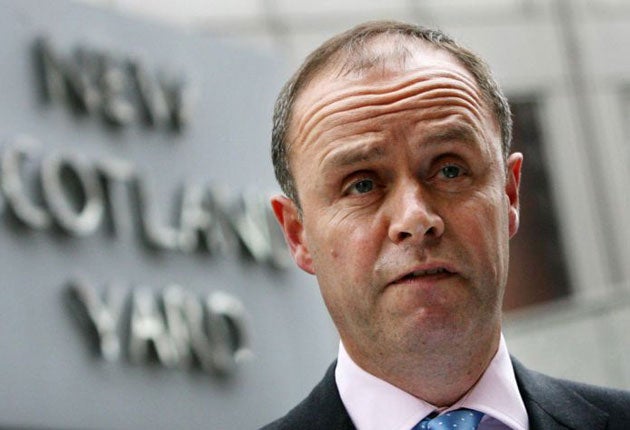Hack row claims second police scalp

The phone-hacking row claimed another major police scalp today as David Cameron rejected suggestions that his own position had been tainted.
Scotland Yard Assistant Commissioner John Yates quit after criticism of his handling of a review of the initial investigation, and failure to recognise the potential threat to the force's reputation.
The news followed hot on the heels of the shock resignation by his boss Sir Paul Stephenson last night over links to former News of the world deputy editor Neil Wallis.
In a parting shot, Sir Paul indicated that his decision to hire Mr Wallis as a media adviser was less controversial than the appointment of the newspaper's ex-editor Andy Coulson as Downing Street communications director.
But asked about the barb during a trip to Africa, Mr Cameron insisted: "The situation in the Metropolitan Police Service is really quite different to the situation in the Government, not least because the issues that the Metropolitan Police are looking at, the issues around them, have had a direct bearing on public confidence in the police inquiry into the News of the World - and indeed into the police themselves.
"For my part what I would say is that we have taken very decisive action. We have set up a judicial inquiry that can look at all aspects of these issues.
"We have helped to ensure a large and properly resourced police investigation that can get to the bottom of what happened, and wrongdoing, and we have pretty much demonstrated complete transparency in terms of media contact."
As he sought to limit damage from the crisis, Mr Cameron said he would be delaying parliament's summer break so he could make a statement on Wednesday.
He also denied that he had made an error of judgment by leaving the country amid the fast-moving events - which will see Rupert Murdoch, son James and ex-News International chief executive Rebekah Brooks make an eagerly awaited appearance before MPs tomorrow.
Questioned by an audience at Johannesburg Stock Exchange later, Mr Cameron dodged questions over whether he had considered resigning. And in his strongest remarks on the subject so far, he said issues of "potential police corruption" had to be addressed.
He said: "I feel I have been out there in Parliament and in press conferences, fully answering the questions, fully transparent, very clear about what needs to be done, making sure that Britain gets to the bottom of what has been a terrible episode in terms of what newspapers have done, hacking into private data, and also some very big questions about potential police corruption - we need to get to the bottom of those."
Downing Street confirmed that Mr Cameron received no warning that Sir Paul was planning to resign until the commissioner made his televised announcement.
A spokeswoman for the Prime Minister also disclosed that a revised list of Mr Cameron's contacts with senior media figures is being published, as there had been some "omissions" from the version issued last week.
Meanwhile, Labour leader Ed Miliband sought to ratchet up the pressure by claiming the Prime Minister was "hamstrung" by connections to Mr Coulson and Ms Brooks.
He said there was a "sharp contrast" between Sir Paul's "honourable" decision to resign and Mr Cameron's repeated refusal to admit he made an "error of judgment" by employing Mr Coulson.
Mr Miliband called for the Prime Minister to "lead a debate" on the fallout from the phone hacking scandal when the Commons sits for an extra day on Wednesday, rather than simply give a statement.
In 2009 Mr Yates carried out a one-day review that concluded there was no cause to reopen the original 2006 hacking investigation. Later that year he served on the committee that vetted Mr Wallis for the media adviser contract.
Accosted by journalists this morning, the assistant commissioner insisted he had done nothing wrong, urging them: "Give me a break."
But the Metropolitan Police Authority's (MPA) professional standards committee was widely expected to suspend him after holding a meeting to consider concerns.
In a statement, Scotland Yard said: "Assistant Commissioner John Yates has this afternoon indicated his intention to resign to the chair of the MPA."
Mr Yates joined a growing list of victims of the controversy, including Mr Coulson, News Corp veteran Les Hinton, Ms Brooks and the 168-year-old News of the World.
Announcing his resignation yesterday, Sir Paul said: "I have taken this decision as a consequence of the ongoing speculation and accusations relating to the Met's links with News International at a senior level and in particular in relation to Mr Neil Wallis who, as you know, was arrested in connection with Operation Weeting last week."
Sir Paul insisted his integrity was intact despite criticism for hiring Mr Wallis as a PR consultant before the former tabloid executive was arrested for alleged mobile phone interception.
The pressure intensified over the weekend after it emerged he accepted thousands of pounds-worth of free accommodation at a luxury health spa, which was also represented by Mr Wallis.
Asked if Mr Cameron should be considering his position in light of Sir Paul's resignation, Deputy Prime Minister Nick Clegg said: "Absolutely not. Of course not.
"Let's keep some perspective here. The fear that people have is that a criminal investigation could be jeopardised by the contact between the police and media."
Mr Cameron, speaking during a visit to South Africa, said: "John Yates was a well-respected detective, and has more recently provided strong leadership on counter-terrorism policing.
"As I said this morning, what matters now is that we ensure swift and effective continuity at the Metropolitan Police Service."
